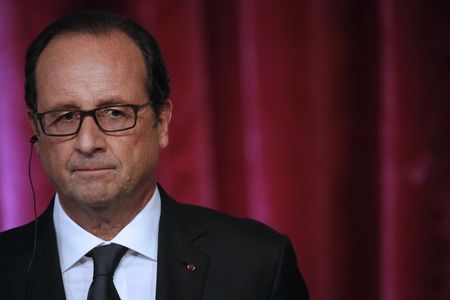By Mark John
PARIS (Reuters) - A bitter public attack by a jilted ex-partner, a cabinet melt-down and the admission of broken economic promises have meant an uncomfortable three weeks for Francois Hollande.
But the hardest is yet to come for the French president, who this week embarks on a struggle to convince Socialist allies, the French people and his European Union partners that he is still fit to run the euro zone's second largest economy.
On Tuesday he must stifle dissent within party ranks against his latest government team to win a confidence vote, thus averting new parliamentary elections his camp would be sure to lose.
Two days later he hope to shore up his domestic approval ratings -- at 13 percent the worst for a French leader in polling history -- in a televised news conference set to last up to three hours.
A no less crucial test comes the following weekend as Prime Minister Manuel Valls heads to Berlin to ask Angela Merkel not to press for EU penalties after France's admission it would break a promise to bring its public deficit within the bloc's limits.
Socialist party managers put at 30 the number of hard-left deputies set to abstain in the confidence vote. They are still seething at Hollande's policy switch in January to favour tax cuts to business in a bid to revive the economy - a move that has failed to kickstart growth stuck barely above zero.
Limited revolt of that order would allow the new government, re-shuffled last month after three rebel ministers were ejected, to scrape approval from the 577-seat assembly with support from centre-left allies outside the Socialist Party.
Hollande, whose image took a fresh knock last week with the publication of a best-selling book by former First Lady Valerie Trierweiler depicting him as smug and distant, will then seek to silence growing calls to resign before the 2017 end of his term.
"He will be speaking directly to the French," said a senior Socialist briefed on the content of Hollande's preamble to the Sept. 18 news conference.
"His message will be: 'You can say what you like - but I am staying till the end'."
The constitution of France's Fifth Republic is specifically designed to let an incumbent leader do that, however unpopular. But the question being asked ever more loudly at home and abroad is: To do what?
"TIME TO DELIVER"
The government announcement on Wednesday that it would delay cutting its deficit by two more years went down badly with euro zone finance ministers at a meeting in Milan on Friday. Some saw it as an affront after the painful cuts many governments have implemented to bring down swollen deficits and win back investor confidence.
But European Central Bank chief Mario Draghi's call in August for euro zone governments to do more to release growth has widened the debate and could mean France will get leniency from European Union partners on its deficit as long as it can prove it is serious about making its economy more competitive.
"It's time to choose: leap forward or face decline," Bank of France governor Christian Noyer said last week.
"If we continue with (economic) growth of just 0.5 percent a year while running deficits of four or five percent a year, it's obvious you fall off a cliff into poverty," he warned.
A first test is on Oct. 1 when France presents a 2015 budget based on a deficit over one percent point higher than that allowed by EU rules but which Paris promises will stick to plans to shave 21 billion euros (16.61 billion pound) off spending projections.
Hollande's new government is also readying proposals to go beyond the modest labour market reform of 2013 to ease rules of worker representation in companies - which bosses say are a costly disincentive to hire - and to de-regulate professions from notaries to pharmacists and driving instructors.
The reforms will not touch France's 35-hour working week and are seen as less incisive than the politically divisive measures carried out in Spain in recent years or the German labour market reforms of the mid-2000s.
But the mood in France and among disgruntled back-benchers is such that they are set to trigger street protests and Valls has not ruled out using decrees to by-pass parliamentary resistance and pass them directly into law.
"When I hear that France plans to use decrees to go faster, I welcome that," said International Monetary Fund chief Christine Lagarde, a conservative former French finance minister.

"Now, as the Americans say, is the time to deliver -- to go from words to deeds," she told Les Echos business daily last week.
(Additional reporting by Elizabeth Pineau; Editing by Ruth Pitchford)
